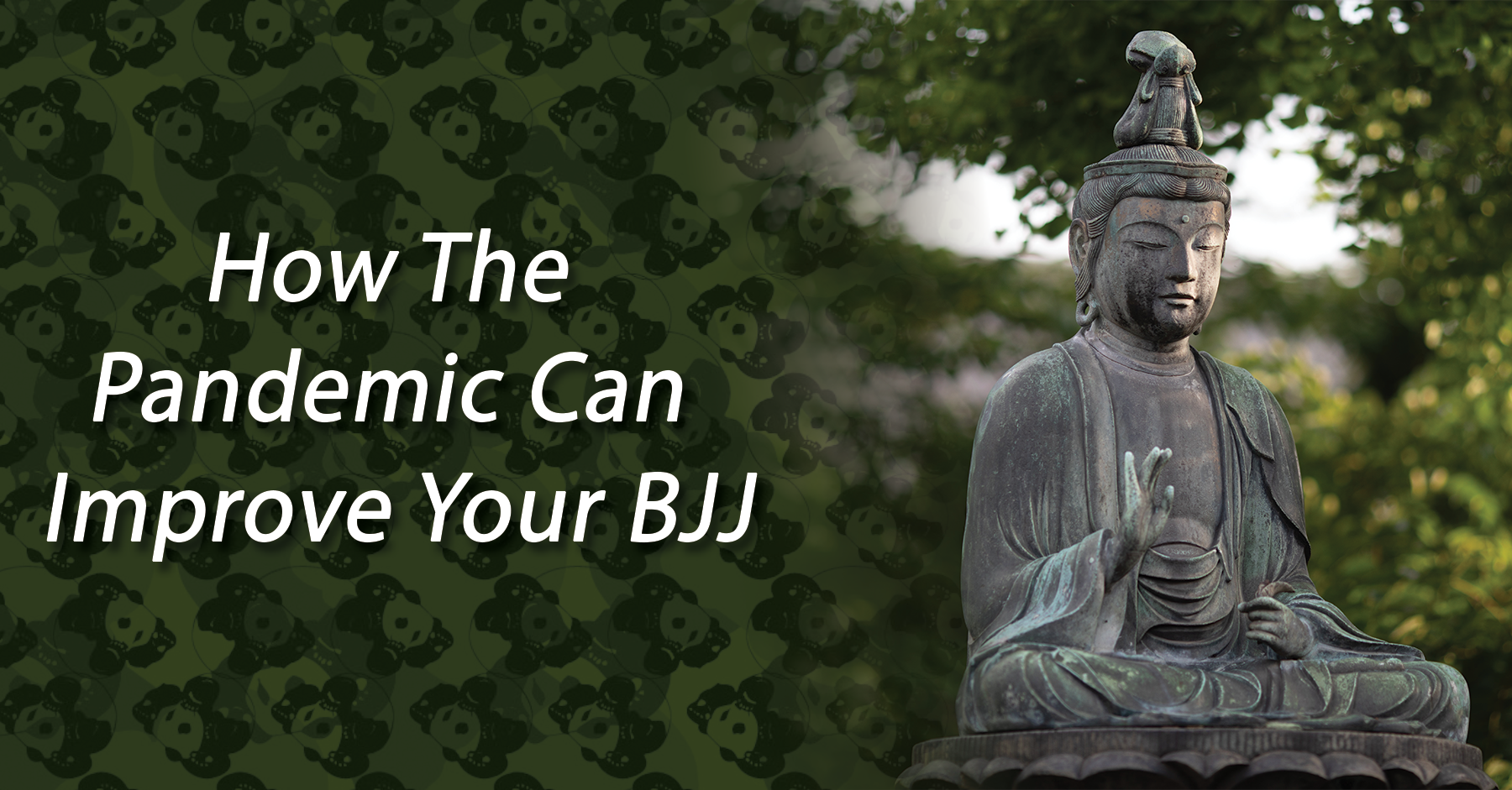
How The Pandemic Can Improve Your BJJ
“The mind stops with recognition.” It’s a frequent rejoinder from my coach and it’s a foundational principle for improving your jiu-jitsu.
You can attribute the idea to The Unfettered Mind, a 17th-century synthesis of Buddhism and martial arts, written by the monk Takuan Sōhō, whose likeness was rendered in the samurai epic, Musashi.
“In Zen, if asked, ‘What is the Buddha?’ one should raise a clenched fist,” Sōhō writes. “If asked, ‘What is the ultimate meaning of the Buddhist Law?’ before the words have died away, one should respond, ‘A single branch of the flowering plum’ or ‘The cypress in the garden.’ It is not a matter of selecting an answer either good or bad. We respect the mind that does not stop.”
The mind that stops at the recognition of a sword falls to the sword, Sōhō explains. The grappler whose mind stops at the recognition of the triangle falls to the triangle.
Back to the beginning
Do you remember what it felt like to be a white belt? It probably felt something like this. To be a white belt is to flounder. Eventually, you begin to dog paddle. My dog paddle was the closed guard with a cross lapel grip and sleeve control.
My mind stopped at closed guard, cross lapel, sleeve control. It was safe here. Closed guard with collar-sleeve control was my hammer, and every BJJ scenario I found myself in was a nail. You can see the self-limiting nature of this approach.
A white belt recently asked me about open guard. It became apparent that his mind had stopped, but he had managed to extricate it.
“People always say, ‘Open guard is an active guard.’ And you think you know what that means,” he said. “But people continued to pass my open guard. I thought I understood what it meant to be active, but I didn’t.”
What this white belt thought he knew -- what it meant to be active in open guard -- was insufficient. His mind had stopped at a low-resolution understanding. It heard or saw the word active and rested. Active. Not passive. Just keep moving.
It would be more accurate to say that to play open guard well, you must be active in the sense that you are always advancing. You are mindfully moving through a system to achieve desired outcomes, accounting for how your opponent responds. You are not lying back, waiting for something to happen or attempting to cage the moment.
The white belt had realized that “be active” as a concept or command is an abstraction. The phrase is an abstraction of a larger concept, like a low-res photo of the Grand Canyon. It may give you a superficial understanding, but that understanding will be incomplete at best. You won’t experience the splendor of the Grand Canyon. You won’t experience the potency of open guard.
In this white belt’s case, his mind began to move again once he received a high-resolution explanation from his instructors, and when he experienced the difference in effective open guard playing for himself.
As we’ve returned to the mats, it seems like there are a select group of grapplers who are suddenly experiencing rapid breakthroughs, like the one described here. Why?
Minds in motion
COVID-19 forced the minds of many serious grapplers to move again. The pandemic was and is a major pattern disruption for those who train. It forced us to reevaluate how and why we grapple. Our old method of learning -- going to a school packed with students and receiving a lesson from an instructor -- no longer functioned.
We improvised with live video feed lessons, grappling dummies, solo drills, domestic partners and pets willing and unwilling. Continuing to do jiu jitsu in 2020 required a new level of mental agility and introspection, creating insights like the one from the white belt at the top of this post. Simply put, few are looking at their game, and the game of jiu-jitsu itself, in the same way.
Owning our education
Ownership has also moved the minds of many grapplers during the pandemic. Traditionally, we’ve outsourced our jiu-jitsu education. We pay tuition to learn from experts. Experience is the ultimate teacher, and this is what we exchange for money.
This is a powerful arrangement, but susceptible to disruptions, like a pandemic. Additionally, it allows many to get complacent in their learning. There’s little homework in jiu-jitsu, unless you assign it to yourself. Homework takes the form of intellectually engaging with the lessons and your rolls, evaluating, and pulling in supplemental material to develop your game. (You can read more about that here.) Our minds stop with the learning structure of the academy.
COVID-19 forced many of us to own our BJJ education. With guided instruction limited by a virus that thrives off of proximity, improving our skills became not just something we outsource, but something we must instigate and maintain ourselves.
Minds moving forward
The pandemic has been a global nightmare from which little good has emerged. But we can extrapolate this small lesson about what it’s done to jiu-jitsu out to a global scale. COVID-19 forced our minds to move again -- to find creative solutions to our games and even our businesses (check out Inverted Gear’s new fitness collection, for example). How might we harness this mental momentum and put it toward addressing some larger existential threats? If nothing else, grapplers are problem solvers, and our minds are primed for the challenge.
Other articles:
Quick links
Contact us
About us
Quality BJJ gear at fair prices, available all year. Founded in 2012 to provide an alternative to high-cost, limited edition gis. Dive into the BJJ lifestyle with us—join the Panda Nation!"
